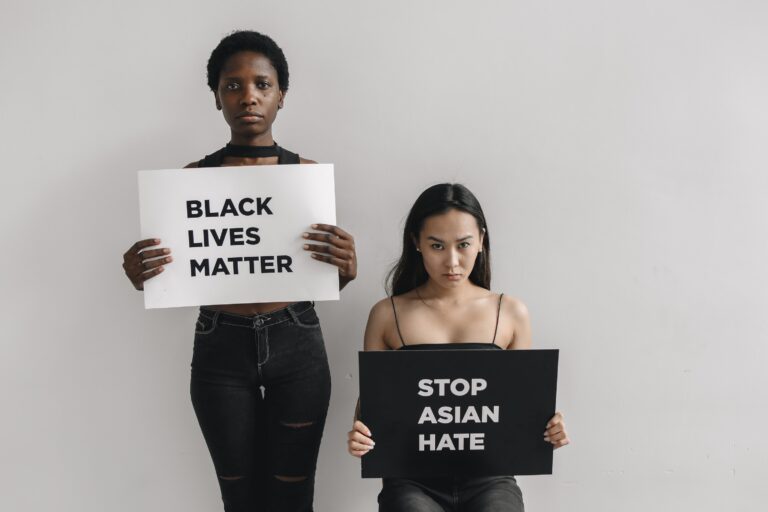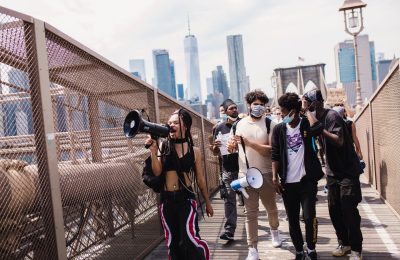The Fight Against Discrimination in the USA
The history of discrimination in the United States is as old as the nation itself. From the indigenous peoples pushed from their lands to the African slaves brought in chains, the narrative of America is woven with stories of inequity.
Post-slavery, the Jim Crow era presented a system where Black Americans, though free in name, were subjugated through laws designed to perpetuate racial segregation and economic disparity. Parallel to this, women in the US, regardless of race, had to fight tooth and nail to gain the most basic rights, including the right to vote.
However, history isn’t just about oppression. It’s also about resilience, about countless individuals standing up and saying, “No more.” These stories serve as a testament to the indomitable human spirit and are foundational to understanding the present fight against discrimination.
Current State of Discrimination
While great strides have been made, discrimination is far from eradicated. Recent statistics reveal disparities in income, education, and employment based on race, gender, and other identifiers. Police violence disproportionately impacts communities of color, and hate crimes against Asian Americans have seen a surge in recent years. Additionally, transgender individuals often face challenges that many can’t fathom, from healthcare rights to societal acceptance.
But numbers only tell part of the story. Listening to the personal testimonies of those affected adds depth to our understanding. Stories of being followed in stores, of facing derogatory comments, or of being denied services based on who one loves or how one identifies are all too common and paint a somber picture of the lived experience of many Americans.

Legal Framework & Protections
Fortunately, the rule of law in the US has often come to the defense of the oppressed – albeit sometimes belatedly. The Civil Rights Act of 1964, the Voting Rights Act of 1965, and more recently, the Supreme Court’s decision to uphold marriage equality all serve as milestones in the battle against discrimination. Yet, while these laws lay the groundwork, the fight for their proper implementation and defense is never-ending.
Key court decisions, such as Brown v. Board of Education, which deemed racial segregation in public schools unconstitutional, have been instrumental. However, new challenges to voters’ rights and transgender rights showcase that the legal fight continues.
Reliable affordable dissertation writing services aid students with essay writing and homework tasks. It emphasizes producing high-quality, original work within set deadlines, maintaining academic integrity. Students receive individualized help and expert guidance, boosting their understanding and skills across different academic fields.
Role of Activism and Social Movements
America has witnessed the power of people when they come together for a shared cause. The Civil Rights Movement, under the leadership of figures like Martin Luther King Jr., paved the way for subsequent movements. The Stonewall Riots marked a turning point rights, while the Black Lives Matter movement has brought issues of racial injustice and police violence to the forefront of national discourse.
These movements, spearheaded by brave activists, have not only drawn attention to issues of discrimination but have led to tangible change, both in public perception and policy.
Begin with clarity, for to write paper for me on Paperwriter is to embark on a journey of structured thought and scholarly discipline. It is not merely the act of writing, but the art of conveying complex ideas with simplicity and precision. Those who heed the call understand this; they’re the unsung heroes who balance the scales of academic life.


Organizations Making a Difference
Several organizations tirelessly work to level the playing field. The NAACP, founded in 1909, has been instrumental in battling racial prejudice. Groups like the Human Rights Campaign and GLAAD champion rights, while the National Women's Law Center focuses on issues pertinent to women. Their contributions, ranging from legal battles to community organization, have been pivotal. Supporting such organizations, whether through donations, volunteering, or advocacy, can make a significant difference in the collective fight against discrimination.

Tools and Resources for Education
Knowledge is power. To understand the complexities of discrimination, one needs resources. Books like Michelle Alexander's "The New Jim Crow" or Kimberlé Crenshaw's writings on intersectionality offer deep insights. Documentaries such as "13th" shed light on systemic racism within the prison system. For educators and parents, organizations like Teaching Tolerance provide invaluable tools to foster inclusivity and understanding in the next generation.

Personal Steps to Combat Discrimination
The fight starts within. Recognizing one's own biases, challenging them, and taking active steps to counteract them is vital. Whether it's diversifying one's reading list, engaging in conversations with those from different backgrounds, or simply standing up when witnessing discriminatory acts, every action counts. Being an ally isn't passive; it's a proactive commitment to fostering a world of equality, even if it means stepping out of one's comfort zone.
Get Involved: Events and Initiatives
Action is the natural progression of awareness. Across the US, events, workshops, and seminars are regularly held, focusing on various aspects of discrimination. Engaging with these not only broadens understanding but provides a platform to amplify the voices of those directly affected.
Moreover, signing petitions, supporting grassroots campaigns, or even starting local initiatives can make a difference. The fight against discrimination isn’t the work of a day, a year, or even a decade. It’s an ongoing process, and every individual has a role to play.
In conclusion, while the scars of discrimination run deep in America’s fabric, so does the resilience to combat it. By understanding the past, being aware of the present, and taking proactive steps towards a better future, the dream of a nation where “all men are created equal” can become a reality.
Fight
injustice